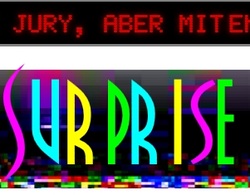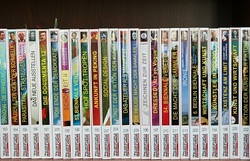
An art prize where the jury includes the applicants
At the German HFBK (Fine Arts University of Hamburg) I found this project. The process of granting art awards, stipends and so forth is known to be quite intransparent. The "Surprise Prize" tackles this problem by putting together a jury of applicants (artists), a standard type jury (of the faculty) and "external experts" (the usual jury, exept they have to apply for this job, too). The process is complicated - it is described on several pages and features instructions for the application itself, presentations, time schedules, scoring systems, and experts acting in roles like advocate or critic. The whole thing takes several days to complete.
Before I read it all, I thought this to be an interesting, albeit questionable approach to challenge the ways of institutional gatekeepers in fine arts - especially since mentor Michael Lingner is not only an artist himself, but, as a professor, also part of the institutional side. But when I came to the part where he describes that participants can bet money on the winning submissions, I realized that this whole thing is more of a grotesque hyperbole on an otherwise unresolvable dilemma of the evaluation of artistic quality. Artistic Satire? Be it as it may, the whole process is real and will, as far as I can see, happen exactly like this. To cut it short, here are the (pretty obvious) pros and the maybe not so obvious cons in my view:
PRO
1. sheds some light on gatekeeper processes
2. ... the idea (even though it does come from a gatekeeper!)
3. reimbursement for participants
4. includes external "experts"
5. applicants may state the categories they wish their project to be judged upon
6. actual grant money can be won
CONTRA
1. The role of the artists. While I do see the problem, the answer cannot be to include artists in the jury process. First, there is no reason why artists should be more qualified to do what in principle cannot be done: to evaluate art in an objective way. Second, as an artist, my job ist to make art. I don't want to do jury work, as a matter of fact I don't want to do anything else, just because that's not what artists do.
2. And because of that, I am neither very much interested in becoming art by being part of some artistic performance. I imagine how great a potential for conflicts and awkward situations the team will face, and how bizarre the part I am expected to play is. How would this make me feel in the actual situation? Probably, at least like being used. In short, this may turn out to be some sort of artist's soap opera.
3. The role of the experts. When someone asked what makes an expert here, it was said: a graduate in an art related field. It is stunning, that this unsurprising inquiry, which at the same time points to the crucial question of how to judge the quality of art, could be answered in this blatantly naive way.
4. My project is the best, or else I would have made it differently.
http://www.hfbk.de/surprize/
At the German HFBK (Fine Arts University of Hamburg) I found this project. The process of granting art awards, stipends and so forth is known to be quite intransparent. The "Surprise Prize" tackles this problem by putting together a jury of applicants (artists), a standard type jury (of the faculty) and "external experts" (the usual jury, exept they have to apply for this job, too). The process is complicated - it is described on several pages and features instructions for the application itself, presentations, time schedules, scoring systems, and experts acting in roles like advocate or critic. The whole thing takes several days to complete.
Before I read it all, I thought this to be an interesting, albeit questionable approach to challenge the ways of institutional gatekeepers in fine arts - especially since mentor Michael Lingner is not only an artist himself, but, as a professor, also part of the institutional side. But when I came to the part where he describes that participants can bet money on the winning submissions, I realized that this whole thing is more of a grotesque hyperbole on an otherwise unresolvable dilemma of the evaluation of artistic quality. Artistic Satire? Be it as it may, the whole process is real and will, as far as I can see, happen exactly like this. To cut it short, here are the (pretty obvious) pros and the maybe not so obvious cons in my view:
PRO
1. sheds some light on gatekeeper processes
2. ... the idea (even though it does come from a gatekeeper!)
3. reimbursement for participants
4. includes external "experts"
5. applicants may state the categories they wish their project to be judged upon
6. actual grant money can be won
CONTRA
1. The role of the artists. While I do see the problem, the answer cannot be to include artists in the jury process. First, there is no reason why artists should be more qualified to do what in principle cannot be done: to evaluate art in an objective way. Second, as an artist, my job ist to make art. I don't want to do jury work, as a matter of fact I don't want to do anything else, just because that's not what artists do.
2. And because of that, I am neither very much interested in becoming art by being part of some artistic performance. I imagine how great a potential for conflicts and awkward situations the team will face, and how bizarre the part I am expected to play is. How would this make me feel in the actual situation? Probably, at least like being used. In short, this may turn out to be some sort of artist's soap opera.
3. The role of the experts. When someone asked what makes an expert here, it was said: a graduate in an art related field. It is stunning, that this unsurprising inquiry, which at the same time points to the crucial question of how to judge the quality of art, could be answered in this blatantly naive way.
4. My project is the best, or else I would have made it differently.
http://www.hfbk.de/surprize/

 RSS Feed
RSS Feed
